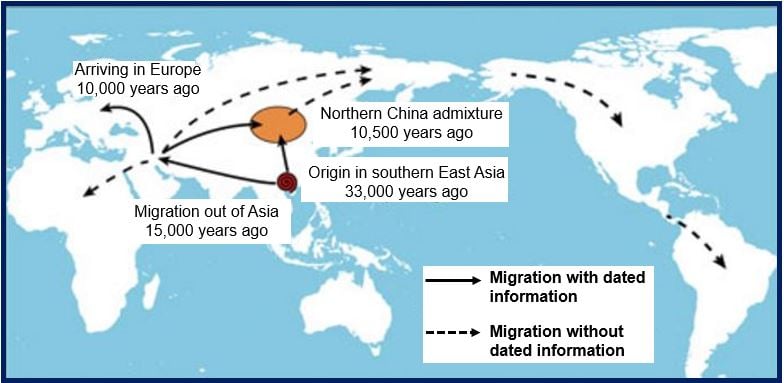Dogs and humans have been together for about 33000 years, with the relationship starting off in southern East Asia, and then migrating to the Middle East, Africa and Europe, says an international team of scientists.
The researchers, who wrote about their study and findings in the academic journal Cell Research, explain that the origin and evolution of man’s best friend remains a controversial question for scientists across the world.
Experts have long disagreed on the domestic dog’s place and date of origin, as well as the number of times dogs were domesticated.
 A proposed migratory history for domestic dogs across the globe, based on the evidence from the study. Solid arrows represent migratory tracts for which there is dating information, while dashed arrows indicate those without accurate dating. (Image: nature.com)
A proposed migratory history for domestic dogs across the globe, based on the evidence from the study. Solid arrows represent migratory tracts for which there is dating information, while dashed arrows indicate those without accurate dating. (Image: nature.com)
The domestic dog (Canis lupus familiaris) is likely our closest companion in the animal kingdom, and has followed us to every corner of the world.
Due to their behavioral and cognitive abilities, domestic dogs have been selected to fulfil several different tasks, including herding, guarding, companionship and hunting.
Peter Savolainen, Associate Professor in Evolutionary Genetics, who works at the School of Biotechnology, Royal Institute of Technology, Solna, Sweden, and colleagues from China, Canada, Finland, Russia and Singapore, used whole genome sequences from 12 gray wolves, 27 primitive dogs from Africa and Asia, and a collection of 19 different breeds from across the globe in their study.
They found that dogs from southern East Asia have a considerably higher genetic diversity compared to other populations around the world, and are the most basal group relating to gray wolves.
This suggests that domestic dogs originated in southern East Asia approximately 33,000 years ago.
 Geographic locations of the 58 canids (dogs and wolves) sequenced in this study. (Image: nature.com)
Geographic locations of the 58 canids (dogs and wolves) sequenced in this study. (Image: nature.com)
About 15,000 years ago, a subset of ancestral dogs began migrating to Africa, the Middle East and Europe. Europe does not appear to have had domestic dogs until about 10,000 years ago, the authors wrote.
One of the lineages that evolved outside Asia also migrated back to the East, creating a several admixed populations. From these lineages, a subset in northern China migrated to the New World.
The scientists say their study unravels, for the first time, the incredible journey that domestic dogs have travelled on Earth.
 Dogs and humans have lived and worked together for many tens of thousands of years.
Dogs and humans have lived and worked together for many tens of thousands of years.
The scientists believe there were two genetically different types of wolves in China, with those from the southern part of the country being the ancestors of domestic dogs.
Prof. Savolainen said:
“The mild population bottleneck in dogs suggests dog domestication may have been a long process that started from a group of wolves that became loosely associated and scavenged with humans, before experiencing waves of selection for phenotypes (mutations) that gradually favored stronger bonding with humans, a process called self-domestication.”
 Throughout history, humans have used dogs for companionship, warmth, hunting, herding, guarding, guiding, and pulling sledges.
Throughout history, humans have used dogs for companionship, warmth, hunting, herding, guarding, guiding, and pulling sledges.
The authors wrote:
“The long persistence of the domestic dog lineage in southern East Asia opens up for interesting scenarios. One possible explanation for the 33 000-year deep divergence between dogs and wolves is that it represents a split among wolf populations, and that South Chinese wolves (ancestors to the dog) were genetically differentiated from the more northern wolves sampled in our study.”
Citation: “Out of southern East Asia: the natural history of domestic dogs across the world,” Guo-Dong Wang, Weiwei Zhai, He-Chuan Yang, Lu Wang, Li Zhong, Yan-Hu Liu, Ruo-Xi Fan, Ting-Ting Yin, Chun-Ling Zhu, Andrei D Poyarkov, David M Irwin, Marjo K Hytönen, Hannes Lohi, Chung-I Wu, Peter Savolainen and Ya-Ping Zhan. Cell Research. Advance online publication 15 December, 2015. DOI: 10.1038/cr.2015.147.
